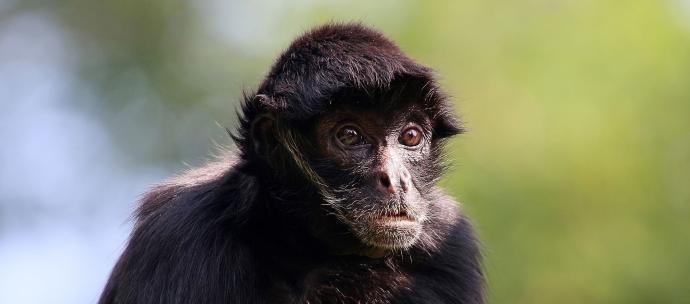Background:
Animal cognition refers to the mechanisms involved in the acquisition, perception and storage of sensory information as well as the use of that information to modify and adapt behavior in the environment. As cognition encompasses a wide array of cognitive abilities, such as learning, memory, decision making and problem solving, it plays a key role in a broad spectrum of behaviors, from foraging to social interactions.
Black-handed spider monkeys (Ateles geoffroyi) are highly specialized frugivores and they display strong fission-fusion dynamics, i.e. dividing and reassembling subgroups according to the availability and distribution of resources. Both, the ecology and sociality of an animal are strongly believed to shape – to some degree at least – the cognitive abilities of the species. Therefore, the distinct ecological and social environment of spider monkeys, along with their behavioral strategies and potential underlying cognitive processes, make this species an interesting subject in which to further explore cognition.
A battery of behavioral tests was used to assess the monkeys’ cognition, i.e. a set of tests designed to evaluate an array of cognitive abilities through an animal’s performance across various tasks. The cognitive domains that were selected for the battery of the present project include object permanence, associative learning, numerical cognition (quantity discrimination and numerosity), and long-term memory.
Object permanence is the ability to understand that an object continues to exist even after it has disappeared from view.
Associative learning is the formation of positive and negative associations with various stimuli.
Numerical cognition refers to the ability to perceive and represent the numerical properties of stimuli.
Long-term memory refers to the ability to reliably integrate and memorize experiences, and to use this knowledge in future challenges.

Aims:
In order to gain more insight into primate cognition, I aimed at assessing the cognitive abilities of spider monkeys, and more specifically, I addressed the following questions:
- Do spider monkeys possess the ability of object permanence?
- Do spider monkeys possess the ability to learn by association?
- Do spider monkeys possess the ability to discriminate relative quantities?
- Do spider monkeys possess the ability to discriminate discrete numbers?
- Do spider monkeys possess the ability to memorize visual information on a long term?
Responsible for this page:
Director of undergraduate studies Biology
Last updated:
05/23/20
